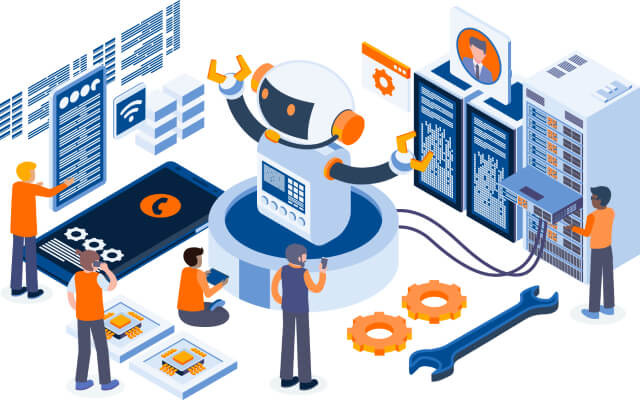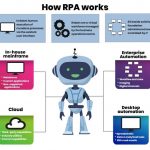The leading software technology in process automation today is Robotic Process Automation. It is a premise for businesses to optimize processes and improve working efficiency.
Not only that, but RPA is also a tool for companies to enter, analyze and process data effectively through a bots system. The following article of WinActor Support will give you an overview of how and what benefits RPA can do in the data creation process.
What Is RPA And How Do Bots Work?
RPA’s full name is Robotic Process Automation that specializes in performing repetitive tasks with fixed logic. Software Robot can work on a selected server or integrate with other technologies to work effectively on a large server.
The working principle of Robotic Process Automation is quite simple. It will rely on its memory ability to perform human tasks.
Specifically, when the staff installs the RPA’s program, the bots system will start to remember every human action. Then it will repeat the next iteration. RPA’s memory ability results from a combination of AI technology and ML machine learning. Thus, software robots can automate tasks efficiently without any difficulty.
Currently, Robotic Process Automation possesses many advantages. The first highlight of this technology platform is its ability to complete tasks quickly. Specifically, RPA works 3 times faster than humans. It can work flexibly in many different interfaces and platforms. Moreover, businesses can apply at any time of the day. It does not require the exact start and end times as humans. Therefore, when the workload increases abnormally, businesses can rely on the help of RPA virtual robots.
The second highlight of RPA is its strict compliance.
Why say: “RPA is a software robot that never goes wrong?”
For simplicity, RPA was born with performing repetitive tasks with fixed logic. It only follows previous human studies and has no creative ability in the process.
As a result, most of the RPA’s flaws come from the employees, not its fault. To take advantage of this precise working ability of RPA, many businesses have applied it in the fields of banking, healthcare, insurance,….
Besides, to apply Robotic Process Automation effectively, businesses will need to note the following:
Things To Consider When Applying RPA
Clearly define the goal of applying RPA
The first task in any RPA project is to define the goal. Most businesses will have a common plan: “optimize inefficient workloads and improve performance.” In addition, each company will have specific goals to each industry and field.
Research the duties of each employee
Researching each employee’s duties allows businesses to implement RPA quickly. Because then, companies will know what their employees are doing, work effectively, and improve work efficiency with RPA. In this way, businesses will shape the volume of each employee’s work so that they can be adjusted to suit their capacity, position, etc….
Clearly define the activity included in the process
Identifying the activities included in the process is a premise for businesses to implement long-term RPA. At the same time, defining tasks also helps automation robot manufacturers to choose RPA bots suitable for companies for each job.
Therefore, enterprises must not skip this step in an RPA project because any error will directly affect the investment cost and the efficiency of process automation of the business.

Benefits of RPA in Data Entry Process
Once the necessary elements of an automation process have been clearly defined, the enterprise can implement RPA. One of the critical tasks of software robots today is data entry.
This work requires absolute speed and precision. Therefore, many businesses have chosen RPA as a perfect virtual assistant to help them perform this task. Here are 4 benefits of Robotic Process Automation in data entry and processing.
Increase in Productivity
The system of RPA bots aggregates and processes business data in real-time; this way, businesses will have an overview and accurate data table by date. They can use it to assess the quality of their current processes.
At the same time, robotic process automation is also a solution to reduce pressure for employees effectively. Staff can move on to essential tasks and bring more value to the business.
Fast Adaptation
The next benefit of RPA in data entry workloads is quickly adapting. Specifically, when the workload changes and requires processing in a short time, the application of software robots is the best choice for businesses. Because RPA can learn and adapt faster than humans, it can be flexibly changed to accommodate those changing tasks. At the same time, adapting bots will help businesses save round capital as existing employees spend more time training new employees.
Scaling
To speed up the process of doing a job, businesses can expand the system of bots to perform the same task. This way, you can speed up the efficient data entry process without human involvement. Employees will have the opportunity to move on to more rewarding tasks.
Security
Data security is one of the essential tasks of every business. Because any data leak to competitors will cause many serious consequences to the development of businesses in the near future. Especially, for employees who have no responsibility and professional ethics, it is straightforward to disclose confidential data.
Many businesses have chosen RPA to limit data leakage. In fact, RPA cannot cheat and cannot distinguish which data is essential. Therefore, there will be no data leakage to the outside. At the same time, RPA will only work on a particular scale, and it provides maximum protection from harmful elements outside. In this way, business data will be the highest security.
Conclusion
Hopefully, this article will give you an overview of the benefits of RPA in data entry workflows. Software robots are technology software that brings exceptionally high value to businesses because they can improve the speed and quality of data and effectively secure data from harmful external elements. However, before choosing RPA implementation, companies must understand each task, purpose, and workload to automate. Because that’s the best way to create an efficient automation process.

WinActor is an RPA software solution by NTT DATA Corporation to help businesses master technology, create breakthroughs in the digital age 4.0.




